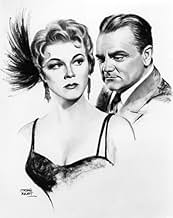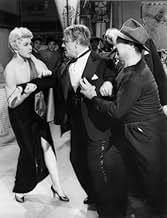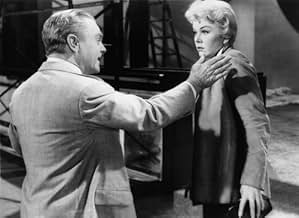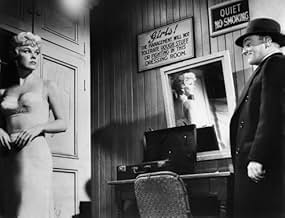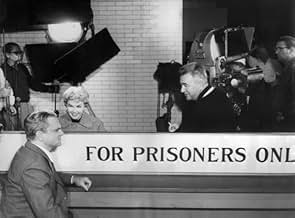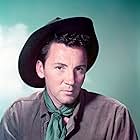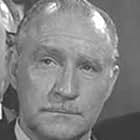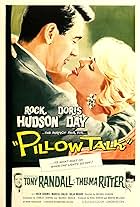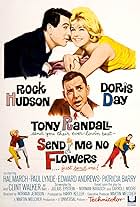IMDb RATING
7.1/10
4.9K
YOUR RATING
A fictionalized account of the career of jazz singer Ruth Etting and her tempestuous marriage to gangster Marty Snyder, who helped propel her to stardom.A fictionalized account of the career of jazz singer Ruth Etting and her tempestuous marriage to gangster Marty Snyder, who helped propel her to stardom.A fictionalized account of the career of jazz singer Ruth Etting and her tempestuous marriage to gangster Marty Snyder, who helped propel her to stardom.
- Won 1 Oscar
- 4 wins & 6 nominations total
Dorothy Abbott
- Dancer
- (uncredited)
John Alban
- Reporter
- (uncredited)
Mal Alberts
- Reporter
- (uncredited)
Herb Alpert
- Nightclub Horn Player
- (uncredited)
Don Anderson
- Club Patron
- (uncredited)
Storyline
Did you know
- TriviaOf the 62 films he made, James Cagney wrote that he rated this among his top five.
- GoofsIn the "Shaking The Blues Away" number, Doris Day sings the lyric "Do as Voodoos do/ Listenin' to/ A voodoo melody." The lyric that Ruth Etting performed in the 1920s was "Do as the darkies do/ Listenin' to/ A preacher way down south." The other lyric is from the revised version performed by Ann Miller in Easter Parade (1948), in which the original was censored for obvious reasons.
- Quotes
Martin Snyder: [to Ruth Etting when she visits him in jail] Tell 'em you seen me in the pokey and I looked great! Tell 'em I like it! Makes me feel like a kid again!
- ConnectionsFeatured in 1955 Motion Picture Theatre Celebration (1955)
- SoundtracksI'm Sitting on Top of the World
(uncredited)
Music by Ray Henderson
Lyrics by Sam Lewis and Joe Young
Sung by Claude Stroud
Featured review
Before she became America's top box-office star by playing its oldest virgin, Doris Day was an instinctive, if untutored, actress and an accomplished, popular singer. In Charles Vidor's Love Me Or Leave Me, she takes on the part of Ruth Etting, the troubled songstress from the jazz age, and her twin talents merge memorably. It's a faultless performance, all the more impressive for staying understated, scaled down.
Her co-star, James Cagney, takes the low road; as Marty (`The Gimp') Snyder, a lopsided fireplug of a man, he sizzles with resentment and ignites into rages. Strangely, his scenery-chewing complements Day's underplaying; the tension between their temperaments fuels this dark drama which occasionally resembles a musical but is closer at heart to film noir (Vidor, after all, directed Gilda).
A taxi-dancer in a Chicago dive, Day catches Cagney's eye (he holds the linen-laundering concession for the place). Finding she's not the quick pick-up he had in mind, he lands her a job in the kick-line at another nitery he services. When he finds out she wants to be a singer, he arranges for lessons with pianist Cameron Mitchell (who plays the thankless role of the loyal but shoved-aside lover). But Cagney, used to getting what he wants and to browbeating everybody around him into surrender, meets his match in Day. Her quiet determination proves every bit as strong as his bellowing bluster. When it looks like her star is in ascendancy, he becomes her manager, puts her on radio, and snares her a spot in New York as a headliner in the Ziegfeld Follies.
They settle into a grudge-match of a marriage, with guerrilla warfare erupting from both sides. (Cagney's Snyder is a marginally less disturbed version of his Cody Jarrett in White Heat.) One of their flashfire fights takes place in her dressing room after a show. Cagney knocks a vase of flowers across the room; Day extends her arm for him to unclasp a bracelet. They bicker some more, with Cagney losing the argument while Day nurses the drink that has become her ally. He leans over and tells her `You oughtta lay off that stuff you're getting to look like an old bag.' It's the chilliest moment in the movie.
In the last third, Day answers a call from Hollywood, which lays the foundation for the unravelling of this messy, nerve-wracking relationship. And if the wrapping up grasps toward the sentimental (with a detour into the melodramatic), it doesn't quite take. Cagney, actor and character, hangs on like a bulldog with a bone. The Marty Snyders never change, and Cagney knows it; he stays the self-deluded small-time hood he started out as, who can't accept that he's driven away a woman he can't believe he loves so much.
Day, however, rises to a magnanimity that rings hollow. Her steely self-confidence about where her talents would bring her, and her casual callousness in using Cagney to help her get there, make her final gesture improbable. But when she takes the spotlight, singing `Mean to Me' or `Ten Cents A Dance' (with her feet planted provocatively defiantly apart), Day, actress and character, takes it by natural right. The voice isn't quite right Etting's was reedy and tremulous, Day's big and secure but the assurance and style are dead on.
Her co-star, James Cagney, takes the low road; as Marty (`The Gimp') Snyder, a lopsided fireplug of a man, he sizzles with resentment and ignites into rages. Strangely, his scenery-chewing complements Day's underplaying; the tension between their temperaments fuels this dark drama which occasionally resembles a musical but is closer at heart to film noir (Vidor, after all, directed Gilda).
A taxi-dancer in a Chicago dive, Day catches Cagney's eye (he holds the linen-laundering concession for the place). Finding she's not the quick pick-up he had in mind, he lands her a job in the kick-line at another nitery he services. When he finds out she wants to be a singer, he arranges for lessons with pianist Cameron Mitchell (who plays the thankless role of the loyal but shoved-aside lover). But Cagney, used to getting what he wants and to browbeating everybody around him into surrender, meets his match in Day. Her quiet determination proves every bit as strong as his bellowing bluster. When it looks like her star is in ascendancy, he becomes her manager, puts her on radio, and snares her a spot in New York as a headliner in the Ziegfeld Follies.
They settle into a grudge-match of a marriage, with guerrilla warfare erupting from both sides. (Cagney's Snyder is a marginally less disturbed version of his Cody Jarrett in White Heat.) One of their flashfire fights takes place in her dressing room after a show. Cagney knocks a vase of flowers across the room; Day extends her arm for him to unclasp a bracelet. They bicker some more, with Cagney losing the argument while Day nurses the drink that has become her ally. He leans over and tells her `You oughtta lay off that stuff you're getting to look like an old bag.' It's the chilliest moment in the movie.
In the last third, Day answers a call from Hollywood, which lays the foundation for the unravelling of this messy, nerve-wracking relationship. And if the wrapping up grasps toward the sentimental (with a detour into the melodramatic), it doesn't quite take. Cagney, actor and character, hangs on like a bulldog with a bone. The Marty Snyders never change, and Cagney knows it; he stays the self-deluded small-time hood he started out as, who can't accept that he's driven away a woman he can't believe he loves so much.
Day, however, rises to a magnanimity that rings hollow. Her steely self-confidence about where her talents would bring her, and her casual callousness in using Cagney to help her get there, make her final gesture improbable. But when she takes the spotlight, singing `Mean to Me' or `Ten Cents A Dance' (with her feet planted provocatively defiantly apart), Day, actress and character, takes it by natural right. The voice isn't quite right Etting's was reedy and tremulous, Day's big and secure but the assurance and style are dead on.
- How long is Love Me or Leave Me?Powered by Alexa
Details
Box office
- Budget
- $2,760,000 (estimated)
- Gross worldwide
- $193
- Runtime2 hours 2 minutes
- Aspect ratio
- 2.55 : 1
Contribute to this page
Suggest an edit or add missing content



